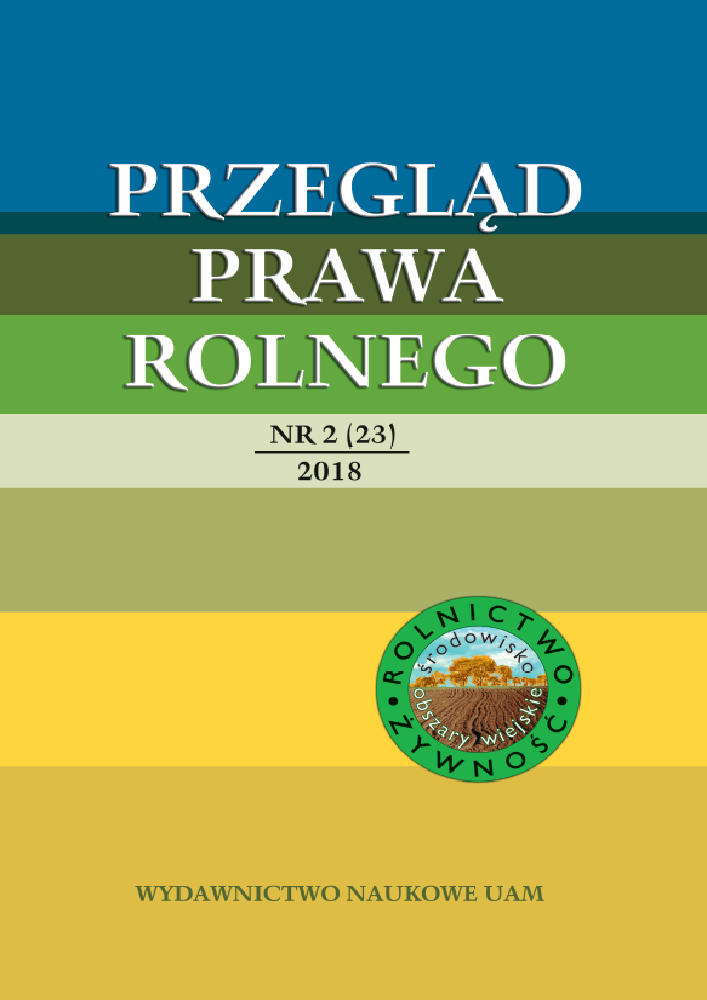Abstrakt
Celem artykułu jest przedstawienie współczesnych wyzwań prawa rolnego w odniesieniu do zrównoważonego rozwoju obszarów wiejskich, z uwzględnieniem polityk rolniczych realizowanych na poziomie lokalnym, regionalnym, międzynarodowym i globalnym. Artykuł skupia się na wpływie podejścia terytorialnego na zrównoważony rozwój obszarów wiejskich i jego znaczeniu dla prawa rolnego. Realizacja koncepcji zrównoważonego rolnictwa na Kubie wymaga konsekwentnego postępu technicznego oraz umiarkowanej, racjonalnej i ekonomicznie uzasadnionej intensyfikacji produkcji, a następnie ograniczania degradacji potencjału produkcyjnego gleby. Konieczny jest także rozwój i modernizacja infrastruktury technicznej terenów wiejskich i samych gospodarstw. Działania te muszą mieć na celu podniesienie poziomu edukacji i wiedzy rolników oraz ich świadomości ekologicznej i wymagają wsparcia finansowego z budżetu państwa oraz funduszy regionalnych. Konieczna jest także poprawa sytuacji dochodowej rolnictwa, gdyż determinuje to możliwości inwestycyjne i proekologiczne, a tym samym zapewnia bezpieczeństwo żywnościowe kraju. Zdaniem autora podejście terytorialne jest skutecznym instrumentem ułatwiającym publiczne zarządzanie obszarami wiejskimi i przyczyniającym się do dalszego rozwoju społeczno-gospodarczego ludności wiejskiej.
Bibliografia
Alburquerque F. (2003), Planes de desarrollo sostenible en los Parques Naturales de Andalucía. Aproximación conceptual y metodológica, Instituto de Desarrollo Regional y Fundación Universitaria, Sevilla.
Bergoetxea J.A. (2017), Principios jurídicos para la ordenación del territorio, http://www.euskonews.com/0061zbk/gaia6102es.html [accesso: 2.09.2017].
Malanos N.L. (2007), Institutos básicos del derecho agrario. Los contratos agrarios, Conferencia en Seminario Intensivo de Derecho Agrario. 31/07/2007 del Número Ext. Revista del Colegio de Abogados de Guatemala.
Malanos N.L. (2007), La multifuncionalidad de la agricultura en relación con los contratos agrarios. Comunicación del IX Congreso de la Unión Mundial de Agraristas Universitarios, UMAU, Marrakech, Marruecos. Del 26 al 30 de noviembre de 2007.
Malanos N.L. (2008), Los contratos agrarios como instrumentos para el desarrollo rural. Conferencia al X Congreso de la UMAU y VIII Congreso del Instituto Argentino de Derecho Agrario. Rosario, Paraná, Argentina. Noviembre/2008.
Padrón L.M. (2008), Más allá del planeamient”. Conferencia Magistral en Seminario Internacional sobre Derecho, Ordenación territorial, Urbanismo y Gestión Pública. La Habana.
Pastorino L.F. (2005), La política europea de desarrollo rural sostenible: ¿Obstáculo o modelo para el Mercosur? La Plata.
Pastorino L.F. (2008), El Ordenamiento Ambiental Territorial. Ponencia al X Congreso Mundial de la UMAU. Rosario y Paraná, Argentina, nov/2008.
Reig Martínez E. (2002), La multifuncionalidad del mundo rural, “Globalización y Mundo Rural” N.° 803, noviembre-diciembr.
Sepúlveda y otros (2008), El enfoque territorial del desarrollo rural, https://www.researchgate.net/publication/228397142_El_enfoque_territorial_del_desarrollo_rural_retos_para_la_reduccion_de_la_pobreza [accesso: 20.06.2018].
Solbrig O.T. (2005), Infocampo Diario La Capital, Rosario, Argentina. Del 15 al 21 de julio de 2005.
Velazco Mugarra M. (2009), Acerca del Ordenamiento Territorial y Urbanístico en el contexto jurídico cubano, español y comunitario, La Habana.
Licencja
Prawa autorskie (c) 2019 Miriam Velazco Mugarra

Utwór dostępny jest na licencji Creative Commons Uznanie autorstwa – Na tych samych warunkach 4.0 Miedzynarodowe.




